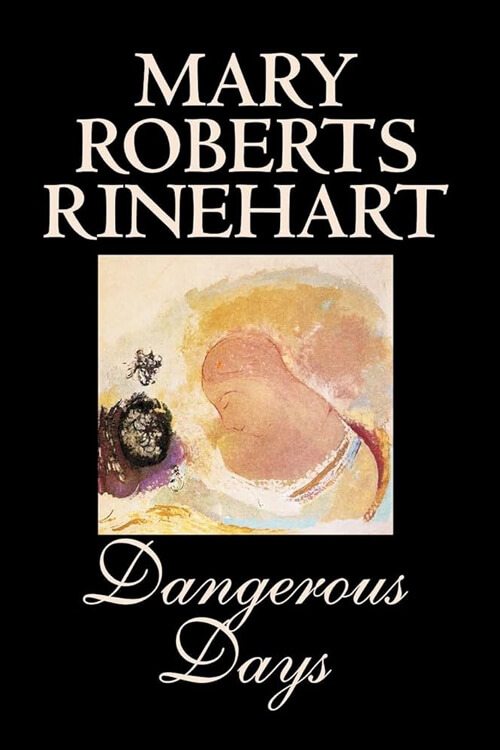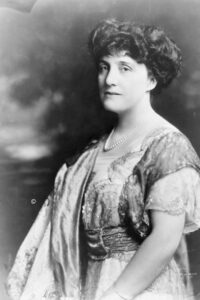
Dangerous Days
Natalie Spencer was giving a dinner. She was not an easy hostess. Like most women of futile lives, she lacked a sense of proportion, and the small and unimportant details of the service absorbed her. Such conversation as she threw at random, to right and left, was trivial and distracted.
Yet the dinner was an unimportant one. It had been given with an eye more to the menu than to the guest list, which was characteristic of Natalie’s mental processes. It was also characteristic that when the final course had been served without mishap, she gave a sigh of relief before the gesture of withdrawal which was a signal to the other women, that she had realized no lack in it. The food was good, and the service was satisfactory. She stood up, slim and beautifully dressed, and gathered up the women with a smile.
The movement found Doctor Haverford, at her left, unprepared and with his coffee cup in his hand. He put it down hastily and rose, and the small cup overturned in its saucer, sending a smudge of brown into the cloth.
“Dreadfully awkward of me!” he said. The clergyman’s smile of apology was boyish, but he was suddenly aware that his hostess was annoyed. He caught his wife’s amiable eyes on him, too, and they said quite plainly that one might spill coffee at home—one quite frequently did, to confess a good man’s weakness—but one did not do it at Natalie Spencer’s table. The rector’s smile died into a sheepish grin.
For the first time since dinner began Natalie Spencer had a clear view of her husband’s face. Not that that had mattered particularly, but the flowers had been too high. For a small dinner, low flowers, always. She would speak to the florist. But, having glanced at Clayton, standing tall and handsome at the head of the table, she looked again. His eyes were fixed on her with a curious intentness. He seemed to be surveying her, from the top of her burnished hair to the very gown she wore. His gaze made her vaguely uncomfortable. It was unsmiling, appraising, almost—only that was incredible in Clay—almost hostile.
Through the open door, the half dozen women trailed out, Natalie in white, softly rustling as she moved, Mrs. Haverford in black velvet, a trifle tight over her ample figure, Marion Hayden, in a very brief garment she would have called a frock, perennial debutante that she was, rather negligible Mrs. Terry Mackenzie, and trailing behind the others, frankly loath to leave the men, Audrey Valentine. Clayton Spencer’s eyes rested on Audrey with a smile of amused toleration, on her outrageously low green gown, which was somehow casually elegant, on her long green ear-rings and jade chain, on the cigarette between her slim fingers.
Audrey’s audacity always amused him. In the doorway, she turned and nonchalantly surveyed the room.
“For heaven’s sake, hurry!” she apostrophized the table. “We are going to knit—I feel it. And don’t give Chris anything more to drink, Clay. He’s had enough.”
She went on, a slim green figure, moving slowly and reluctantly toward the drawing-room, her head held high, a little smile still on her lips. But, alone for a moment, away from curious eyes, her expression changed, her smile faded, and her lovely, irregular face took on a curious intensity. What a devilish evening! Chris drank too much, talking wildly, and always with furtive eyes on her. Chris! Oh, well, that was life, she supposed.
She stopped before a long mirror and gave a bit of careless attention to her hair. With more care, she tinted her lips again with a cosmetic stick from the tiny, diamond-studded bag she carried. Then she turned and surveyed the hall and the library beyond. A new portrait of Natalie was there, hanging on the wall under a shaded light, and she wandered in, still with her cigarette, and surveyed it. Natalie had everything. The portrait showed it. It was beautiful, smug, complacent.
Read or download Book
Mary Roberts Rinehart
Mary Roberts Rinehart (August 12, 1876 – September 22, 1958) was an American writer, often called the American Agatha Christie. Rinehart published her first mystery novel The Circular Staircase in 1908, which introduced the “had I but known” narrative style. Rinehart is also considered the source of the “the butler did it” plot device in her novel The Door (1930), although the exact phrase does not appear in her work. She also worked to tell the stories and experiences of front-line soldiers during World War I, one of the first women to travel to the Belgian front lines.
Biography
Rinehart was born Mary Ella Roberts in Allegheny City, Pennsylvania, now a part of Pittsburgh. A sister, Olive Louise, four years Mary’s junior, would later gain recognition as an author of children’s books and as a nationally syndicated newspaper columnist. Her father was a frustrated inventor, and throughout her childhood, the family often had financial problems. Her father committed suicide when Mary was 19 years old. Tending to be left-handed at a time when that was considered disadvantageous, she was trained to use her right hand instead.
She attended public schools and graduated at age 16, then enrolled at the Pittsburgh Training School for Nurses at Pittsburgh Homeopathic Hospital, where she graduated in 1896. She described the experience as “all the tragedy of the world under one roof.” After graduation, she married Stanley Marshall Rinehart (1867–1932), a physician she had met there. They had three sons: Stanley Jr., Alan, and Frederick.
During the stock market crash of 1903, the couple lost their savings, spurring Rinehart’s efforts at writing as a way to earn income. She was 27 that year and produced 45 short stories. In 1907, she wrote The Circular Staircase, the novel that propelled her to national fame. According to her obituary in the Pittsburgh Post-Gazette in 1958, the book sold 1.25 million copies. Her regular contributions to The Saturday Evening Post were immensely popular and helped the magazine mold American middle-class taste and manners.
In 1911, after the publication of five successful books and two plays, the Rineharts moved to the Pittsburgh suburb of Glen Osborne, where they purchased a large home at the corner of Orchard and Linden Streets called “Cassella.” Before they could move into the house, however, Mrs. Rinehart had to have it completely rebuilt because it had fallen into disrepair. “The venture was mine, and I had put every dollar I possessed into the purchase. All week long I wrote wildly to meet the payroll and contractor costs,” she wrote in her autobiography. In 1925, the Rineharts sold the house to the Marks family; the house was demolished in 1969. Today, a Mary Roberts Rinehart Nature Park sits in the borough of Glen Osborne at 1414 Beaver Street, Sewickley, Pennsylvania.
Rinehart’s commercial success sometimes conflicted with her expected domestic roles of wife and mother, yet she often pursued adventure, including a job as a war correspondent for The Saturday Evening Post at the Belgian front during World War I. During her time in Belgium, she interviewed Albert I of Belgium, Winston Churchill, and Mary of Teck, writing of the latter “This afternoon I am to be presented to the queen of England. I am to curtsey and to say ‘Your majesty,’ the first time!” Rinehart was working in Europe in 1918 to report on developments to the War Department and was in Paris when the armistice was signed.
In 1922, the family moved to Washington, DC, when Dr. Rinehart was appointed to a post in the Veterans Administration. She was a member of the Literary Society of Washington from 1932 to 1936. Her husband died in 1932, but she continued to live in Washington until 1935 when she moved to New York City. There she helped her sons found the publishing house Farrar & Rinehart, serving as its director.
She also maintained a vacation home in Bar Harbor, Maine. In 1947, a Filipino chef who had worked for her for 25 years fired a gun at her and then attempted to slash her with knives until other servants rescued her. The chef committed suicide in his cell the next day.
Rinehart suffered from breast cancer, which led to a radical mastectomy. She eventually went public with her story, at a time when such matters were not openly discussed. The interview “I Had Cancer” was published in a 1947 issue of the Ladies’ Home Journal; in it, Rinehart encouraged women to have breast examinations.
Rinehart received a Mystery Writers of America special award a year after she published her last novel and an honorary doctorate in literature from George Washington University.
On November 9, 1956, Rinehart appeared on the interview program Person to Person. She died at age 82 at her apartment at 630 Park Avenue in New York City.






